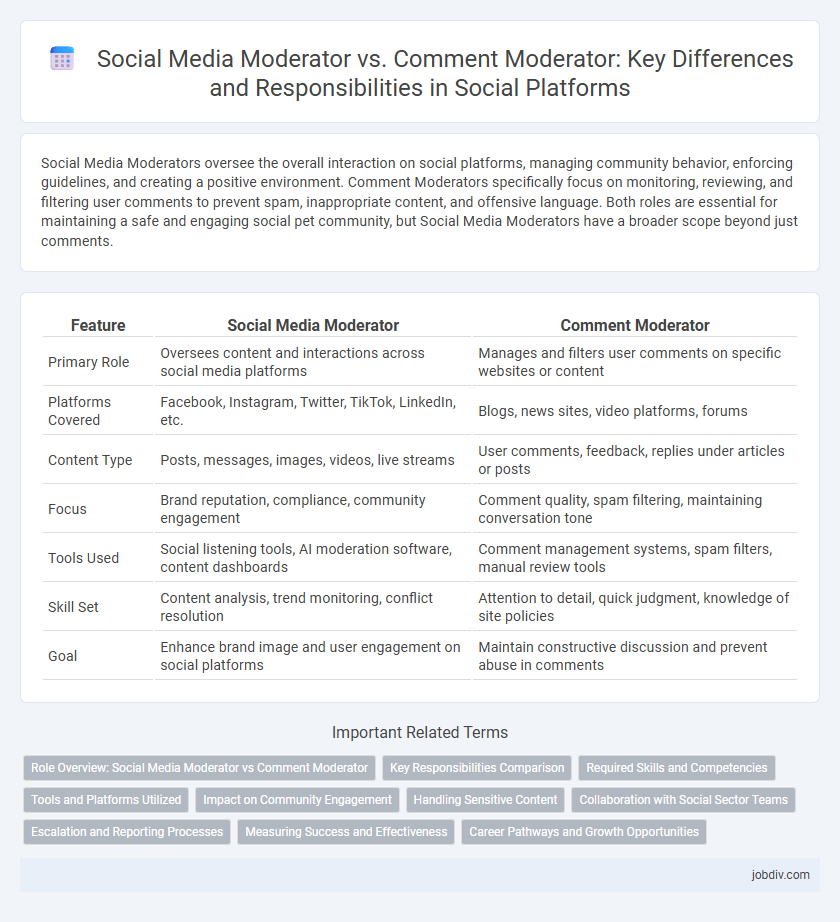Social Media Moderators oversee the overall interaction on social platforms, managing community behavior, enforcing guidelines, and creating a positive environment. Comment Moderators specifically focus on monitoring, reviewing, and filtering user comments to prevent spam, inappropriate content, and offensive language. Both roles are essential for maintaining a safe and engaging social pet community, but Social Media Moderators have a broader scope beyond just comments.
Table of Comparison
| Feature | Social Media Moderator | Comment Moderator |
|---|---|---|
| Primary Role | Oversees content and interactions across social media platforms | Manages and filters user comments on specific websites or content |
| Platforms Covered | Facebook, Instagram, Twitter, TikTok, LinkedIn, etc. | Blogs, news sites, video platforms, forums |
| Content Type | Posts, messages, images, videos, live streams | User comments, feedback, replies under articles or posts |
| Focus | Brand reputation, compliance, community engagement | Comment quality, spam filtering, maintaining conversation tone |
| Tools Used | Social listening tools, AI moderation software, content dashboards | Comment management systems, spam filters, manual review tools |
| Skill Set | Content analysis, trend monitoring, conflict resolution | Attention to detail, quick judgment, knowledge of site policies |
| Goal | Enhance brand image and user engagement on social platforms | Maintain constructive discussion and prevent abuse in comments |
Role Overview: Social Media Moderator vs Comment Moderator
Social Media Moderators oversee multiple platforms, managing content, user interactions, and enforcing community guidelines to maintain a positive online environment. Comment Moderators specialize in monitoring and evaluating user comments on specific posts or articles, filtering out spam, hate speech, and irrelevant content to ensure constructive discussions. Both roles require keen attention to detail and strong communication skills but differ in scope and platform responsibility.
Key Responsibilities Comparison
Social media moderators manage overall content across platforms, ensuring compliance with community guidelines and removing harmful or inappropriate posts to maintain a positive user experience. Comment moderators specifically focus on monitoring, reviewing, and filtering user comments to prevent spam, harassment, or offensive language within conversations. Both roles require vigilance and quick decision-making but differ in scope, with social media moderators overseeing broader content while comment moderators target interaction quality within discussions.
Required Skills and Competencies
Social media moderators require expertise in platform-specific algorithms, community guidelines, and real-time content filtering to manage overall brand reputation and user engagement effectively. Comment moderators specialize in analyzing user-generated comments, identifying spam, offensive language, and ensuring conversations remain respectful and relevant, necessitating strong attention to detail and conflict resolution skills. Both roles demand excellent communication abilities, cultural sensitivity, and proficiency in moderation tools to maintain a positive online environment.
Tools and Platforms Utilized
Social media moderators commonly use comprehensive platforms like Hootsuite, Sprout Social, and Facebook Business Suite to manage multiple channels, schedule posts, and monitor overall community health. Comment moderators often rely on specialized tools such as Disqus, Livefyre, or native moderation features within platforms like YouTube and Instagram to filter, approve, or delete user comments efficiently. Both roles leverage AI-powered tools like Brandwatch and Talkwalker for sentiment analysis and real-time alerting to maintain positive engagement.
Impact on Community Engagement
Social media moderators enhance community engagement by managing diverse interactions across platforms, ensuring content aligns with brand values and fostering positive user experiences. Comment moderators focus specifically on filtering and responding to user comments, directly influencing conversation quality and encouraging respectful dialogue. Both roles are critical in maintaining vibrant, safe online communities, but social media moderators typically have a broader impact on overall community interaction dynamics.
Handling Sensitive Content
Social media moderators manage a broad range of content across platforms, enforcing community guidelines and addressing issues like misinformation and hate speech. Comment moderators specifically focus on user comments, filtering out offensive language, spam, and sensitive topics to maintain constructive conversations. Both roles require strong judgment skills and an understanding of platform policies to effectively handle sensitive content and protect user experience.
Collaboration with Social Sector Teams
Social Media Moderators collaborate closely with social sector teams to ensure community guidelines are upheld across platforms, while Comment Moderators focus specifically on monitoring and managing user feedback to maintain respectful dialogue. Both roles require real-time communication and coordination to address sensitive issues and promote positive engagement within diverse online communities. Effective teamwork between these moderators and social sector professionals enhances crisis response, content accuracy, and audience trust management.
Escalation and Reporting Processes
Social media moderators handle broader platform governance, including content review, user behavior monitoring, and enforcing community standards, escalating complex violations to specialized teams. Comment moderators focus specifically on monitoring user interactions within comment sections, identifying harmful or inappropriate remarks, and reporting these to higher-level moderators for action. Both roles require streamlined escalation and reporting processes to maintain safe and engaging online environments effectively.
Measuring Success and Effectiveness
Measuring success for social media moderators involves tracking engagement rates, response times, and the overall health of the online community, while comment moderators focus specifically on the quality and relevance of user comments to ensure positive interactions. Key performance indicators (KPIs) for social media moderators include sentiment analysis, user retention, and incident resolution speed, whereas comment moderators prioritize comment approval rates, spam reduction, and conflict mitigation. Both roles leverage analytics tools and community feedback to continuously improve moderation strategies, optimizing user experience and platform reputation.
Career Pathways and Growth Opportunities
Social media moderators oversee overall content and community engagement across platforms, ensuring brand alignment and policy compliance, which positions them for career growth into community management or digital marketing roles. Comment moderators specialize in monitoring and managing user comments to maintain positive interactions and filter harmful content, offering a focused pathway towards content strategy or customer experience roles. Both roles provide foundational skills in communication, conflict resolution, and platform analytics that are crucial for advancing into senior moderation or social media management positions.
Social Media Moderator vs Comment Moderator Infographic

 jobdiv.com
jobdiv.com